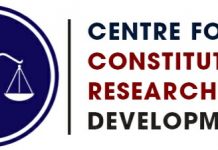“5th August is the darkest day in Indian democracy. The unilateral decision to scrap Article 370 was illegal and unconstitutional.”[1]
—
Mehbooba Mufti, Former Chief Minister, Jammu and Kashmir
“Jammu and Kashmir (J&K) has the distinction of being the only state in the Indian Union that negotiated its terms of accession.”[2]On 26 October 1947, Maharaja Hari Singh signed the ‘Instrument of Accession’[3] which was later instituted as Article 306A in the Constitution of India by the Constituent Assembly and was drafted by Sheikh Abdullah in 1949 which provided autonomy to J&K. This article became operative from the 17th of November, 1952 as Article 370.[4] Article 370 is labelled under Part XXI of the Indian Constitution which prescribes the ‘Temporary, Transitional and Special Provisions’.[5] Article 370(3) of the Constitution empowers the President to abrogate Article 370 on the recommendation of the Constituent Assembly of Jammu and Kashmir. This article allows J&K to have a separate flag and a Constitution. Article 35A of the Indian Constitution plays an important role with respect to the relationship between the Union and the State of J&K. This article allows J&K to define “permanent residents” of the state and provide rights and privileges to these people. This article was added through a Presidential Order in 1954, i.e. The Constitution (Application to Jammu and Kashmir) Order, 1954, ‘in exercise of the powers conferred by’ clause (1) of Article 370, with the concurrence of the Government of the State of J&K.[6] On the 5th of August, 2019, Article 370 was abrogated by a Presidential Order- The Constitution (Application to Jammu and Kashmir) Order, 2019.[7] Moreover, the Parliament passed the Jammu and Kashmir Reorganization Bill, 2019 on the 6th of August, 2019 which bifurcates the state into two union territories, leaving Ladakh without a legislature. [8]
The Constituent Assembly of J&K was dissolved in 1957 and the Legislative Assembly was dissolved in June 2018 after the Governor’s Rule was declared. Later, in December 2018, Presidential rule was declared subsequent to which there was uproar in the Parliament with respect to the abrogation of Article 370.
“The main questions before the Supreme Court now are:
- Whether the abrogation of Article 370 was constitutional or not?
- Whether the President has abused his emergency powers?
- Whether the power of modification under Article 370(1) was exceeded?
- Whether the order passed was contrary to article 370(3) and is unconstitutional?
- Whether the orders passed by the president with respect to the abrogation of Article 370 are void as it is violative of the feature of federalism?”[9]
- No recommendation of the Legislative Assembly of Jammu and Kashmir
The President’s rule was imposed under Article 356 of the Indian Constitution since June 2018. The decisions were taken by the Governor and not by any elected government. A governor does not represent the will of the people. In the case of Mohammed Maqbool v. State of Jammu and Kashmir, the court held the state of J&K has the right to decide who will give consent on their behalf.[10]A.G Noorani in his book- Article 370: A Constitutional history of Jammu and Kashmir, mentioned six special provisions for the State of Jammu and Kashmir. One of the provisions empowers the President to make an order to revoke Article 370, only with the recommendation of the Legislature of the State.[11]In this case, no such consent was requested and an unilateral decision of abrogation was made. Moreover, according to the Constitution of Jammu and Kashmir, an elected government should be representing the state and in the absence of such government, it is the duty of the Union to have consulted the citizens of J&K before making such a unprecedented move.[12] J&K has been under the President’s rule since 2018 and has not been represented by a legislature which is why the will of the people could not be expressed.
The principles of democracy has been violated by the abrogation as the concurrence happened when J&K was under emergency and without an elected government which will represent the will of the people.[13] “Substituting the concurrence of the State with concurrence by Governor under President’s Rule, ignoring the need for significant political decisions flowing from an elected government, is a violation of the democracy.”[14] Article 356 was abused and fraud was committed on the Constitution, “similar to the constitutional device of executive legislation under ordinance making powers- which has been held to be fraud on the Constitution.”[15]
- Abuse of powers under Article 356 of the Indian Constitution
Powers under Article 356 have not been used appropriately. This article transfers the powers of the executive and legislative powers to the Parliament and President.[16] It is pertinent to note that the constituent power of a state cannot be transferred to the centre through the mentioned article. Therefore, if a recommendation is not requested by the state, the union cannot unilateral decide to take away the autonomy of a state, which is guaranteed under the Indian Constitution. Moreover, according to Article 370(1)(d), the government of Jammu and Kashmir enjoys a constituent power and not the Governor.[17] For this abrogation, the constituent power of the State legislature or State Assembly was not utilized and therefore, the whole process is unconstitutional.
- Misinterpretation of the word ‘modifications’ under Article 370(3)
The central government clearly exceeded their power of ‘modification’ under Article 370(3) by declaring the Constitution of Jammu and Kashmir null, which was in force for the last 70 years. Earlier in cases like Puranlal v. President of India and Sampath Prakash v. State of Jammu and Kashmir[18][19], the court implied that the powers of President, under Article 368, are wide and unlimited. This misinterpretation was overruled in the landmark case of Kesanvananda Bharati v. State of Kerala. In this case, the 13-judge constitutional bench held that “no power is unlimited and all power, including constituent amending power is subjected to limitations.”[20] Therefore, according to this landmark judgement, the President has abused his powers under this article.
- Violation of the Doctrine of Federalism
This act of revoking Article 370 by the Union Government clearly violated the feature of Federalism of the Constitution. In the case of State Bank of India v. Santosh Gupta, the court held that the J&K is a quasi-federal structure of the Indian Constitution. Shehla Rashid’s petition in the Supreme Court argued that if Article 370(1)(d) is read with Article 368, the State of Jammu and Kashmir is allowed to decide if the amendments made by the Constitution of India will apply to it or not. Moreover, it was contended that “the Parliament has limited powers over Jammu and Kashmir including in the realm of Foreign Affairs, Defence and Communication and other branches listed in the 1954 order.”[21]
In R.C Poudyal v. Union of India, the court said that the states can have non-identical relations with the Union government as it depends on their accession and their social, political and cultural history. This implies that the Union cannot amend the relationship between states under Part XXI of the Constitution, arbitrarily, without consulting the State.[22]
A book by the former CJI, A.S Anand, called ‘The Constitution of Jammu and Kashmir: Its Development &Comments’, mentioned, “the temporary provision does not mean that the article is capable of being abrogated, modified unilaterally.”[23]
- Unconstitutionality of the Jammu and Kashmir Reorganization Act, 2019
The Jammu and Kashmir Reorganization Bill, passed on the 6th of August, 2019, was violative of Article 3. There’s a procedure prescribed under the said article and the Union Government did not follow it. The Parliament is not empowered to change the entirety of a state’s character, i.e. bifurcating it into two union territories. The basic feature of Federalism was violated here. The Legislative Assembly of the State was dissolved when the Governor’s rule was instituted but the Legislative council still subsisted. A bifurcation of a state is a critical decision and to make such a decision, the Parliament needs to consult the legislature of that particular state. In this case the Legislative council was present, but no deliberations have been made with them.[24]
- Violation of Parliamentary Procedure
The Bill was not introduced in the Rajya Sabha according to the prescribed procedure. According to Rule 33 of the Rules of Procedure and Conduct of Business in Rajya Sabha, the committee must specially allot a time to deliberate upon newly introduced bills.[25]Because time for deliberation was not allotted, the committee violated Rule 33. Moreover, bills of such importance should be placed under the List of Business. The Jammu and Kashmir Reorganization Bill was placed under the Supplementary List. Therefore, it is clear that the bill was introduced with a certain level of secrecy and haste.[26]
- Violation of Freedom of Press
On the 4th of August 2019, all networks and internet services were discontinued and shut down in Jammu and Kashmir without any orders by the authorities. There was a virtual blackout in the state. This absolute and complete network shutdown in Kashmir valley, at such a time is a grave violation of the right of the people to know about the information that directly impacts their lives and their future.
There was a violation of freedom of press. The media plays an essential role in the preservation of democratic character. Under Article 19(1)(a) of the Indian Constitution, the Hon’ble Supreme Court, in numerous cases, held that the no authority can interfere with the content and circulation of newspapers, even in the name of public interest. In the case of Indian Express Newspapers v. Union of India, the Hon’ble Supreme Court held “The purpose of the press is to advance the public interest by publishing facts and opinions without which a democratic electorate cannot make responsible judgements. Newspapers being surveyors of news and views having a bearing on public administration very often carry material which would not be palatable to governments and other authorities”.[27]
According to case of Sakal Papers Ltd v. Union of India, the court held that the state cannot use indirect means to restrict the freedom of newspaper circulation and such an act was held unconstitutional. The court said, “The circulation of a newspaper is a part of the right of freedom of speech and the freedom of speech and expression of opinion is of paramount importance under a democratic Constitution which envisages changes in the composition of legislatures and governments and must be preserved”.
The European Court on Human Rights held in Ahmet Yildrim v. Turkey, “In modern democracies, the internet has acquired significant importance in terms of the exercise of fundamental rights and freedoms, especially the freedom of expression. Social media platforms are thus indispensable tools for the exercise of the right to freedom of expressing and sharing information and ideas.”[28]
- Violation of the Right to Know
“The Freedom of the press under Article 19(1)(a) stems from the Right to Know available to all citizens under Article 21 of the Constitution of India.”[29] The Hon’ble Supreme Court in Dinesh Trivedi v. Union of India held that the citizens have a right to know about the government decisions and actions. [30] The shutting down of network access in the Kashmir valley has violated the ‘right to know’ of the people of Kashmir about the Union Government’s decisions and policies pertaining to this abrogation and reorganization of the State of Jammu and Kashmir. “The shutting down of communication and flow of information, including denial access to television, also amounts to a denial of information which is otherwise available as part of the public records for public consumption and use, and such denial is undemocratic and unconstitutional. The information which cannot be denied under Right to Information (RTI), cannot be indirectly denied in some other form. Thus, information like parliamentary debates and live telecast on television cannot be denied to the people of Kashmir valley by shutting down internet and cable services.”[31] Moreover, the order of shutting down mobile networks, internet, telephone and other services were not made through a public domain nor was it published, thereby, making it illegal and an abuse of state power.[32]
Conclusion
Through the above case laws and arguments, it is safe to conclude that the revocation of Article 370 was procedurally unconstitutional. It was a sudden and undeliberated decision. It was a nihilistic move by the Government. The abrogation has violated numerous articles of the Constitution of India. The political leaders of Jammu and Kashmir are under house arrest and this decision was taken against their consent. There have been numerous unrecorded Human Rights violations in the state. Moreover, the pluralistic nature of our country is being violated and the decisions of our constitutional makers are being undermined. I strongly believe that the Judiciary should hold this abrogation as unconstitutional.
[1]Mehbooba Mufti, Twitter Profile, https://twitter.com/MehboobaMufti?ref_src=twsrc%5Etfw%7Ctwcamp%5Etweetembed%7Ctwterm%5E1158266497568890881&ref_url=https%3A%2F%2Fwww.indiatoday.in%2Findia%2Fstory%2Fkashmir-article-370-mehbooba-mufti-jammu-reaction-amit-shah-1577421-2019-08-05., last seen on 22/08/2019.
[2]Ajaz A. Wani, Article 370: A Constitutional History of Jammu and Kashmir, 4 International Journal of Law 1, (2018).
[3]Instrument of Accession, 1947 (India).
[4]Id.
[5]INDIA CONST. art 370.
[6]Dhruv Katoch, Article 35A and the Future of Stability in Kashmir, Centre for Land Warfare Studies Journal, 110 (2017).
[7]The Constitution (Application to Jammu and Kashmir) Order, C.O. 272, 2019 (India).
[8]The Jammu and Kashmir Reorganization Act, 2019 (India).
[9] Dr. Shah Faesal v. Union of India, Writ Petition (Civil) No.___ of 2019 (Supreme Court of India, 19/08/2019).
[10]Mohammed Maqbool v. State of Jammu and Kashmir, (1972) 2 S.C.R 1014 (India).
[11]ABDUL G. NOORANI, A CONSTITUTIONAL HISTORY OF JAMMU AND KASHMIR, (2011).
[12]JAMMU AND KASHMIR CONST.
[13] S.R Bommai v. Union of India, (1994) 3 S.C.C. 1 (India).
[14] Supra note 9.
[15] Krishna Kumar Singh v. State of Bihar, 2017 (2) S.C.J. 136 (India).
[16]INDIA CONST. art. 356.
[17]INDIA CONST. art. 370.
[18]Puranlal Lakhanpal v. President of India and Ors, (1961) A.I.R. 1519 (India).
[19]Sampath Prakash v. State of Jammu and Kashmir, (1970) A.I.R. 1118 (India).
[20]Kesavananda Bharati v. State of Kerala, (1973) 4 S.C.C. 225 (India).
[21]Supra note 9.
[22]R.C Poudyal v. Union of India, (1983) A.I.R. 1804 (India).
[23]ADARSH S. ANAND, THE CONSTITUTION OF JAMMU AND KASHMIR: ITS DEVELOPMENT AND COMMENTS, (8th ed. 2016).
[24]Supra note 9.
[25]Rules of Procedure and Conduct of Business in Rajya Sabha, Rule 33, 2016 (India).
[26]Id.
[27] Indian Express Newspapers v. Union of India, (1985) 1 S.C.C. 641 (India).
[28] Anuradha Bhasin v. Union of India & Ors, Writ Petition (Civil) No. 28817 of 2019 (Supreme Court of India, 10/08/2019).
[29] Id.
[30] Dinesh Trivedi v. Union of India, (1997) 4 S.C.C. 306 (India).
[31] Supra note 28.
[32] Id.







